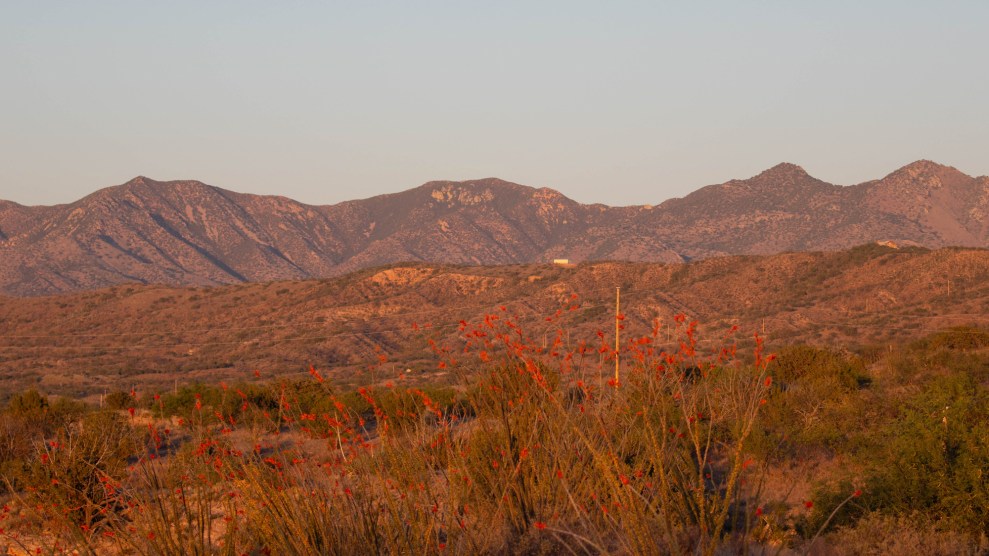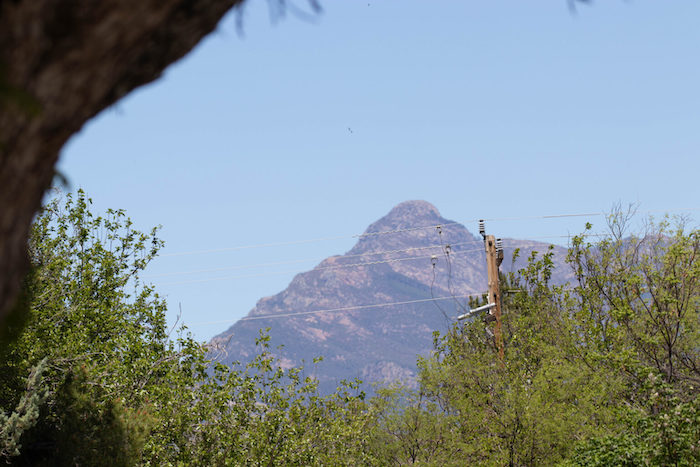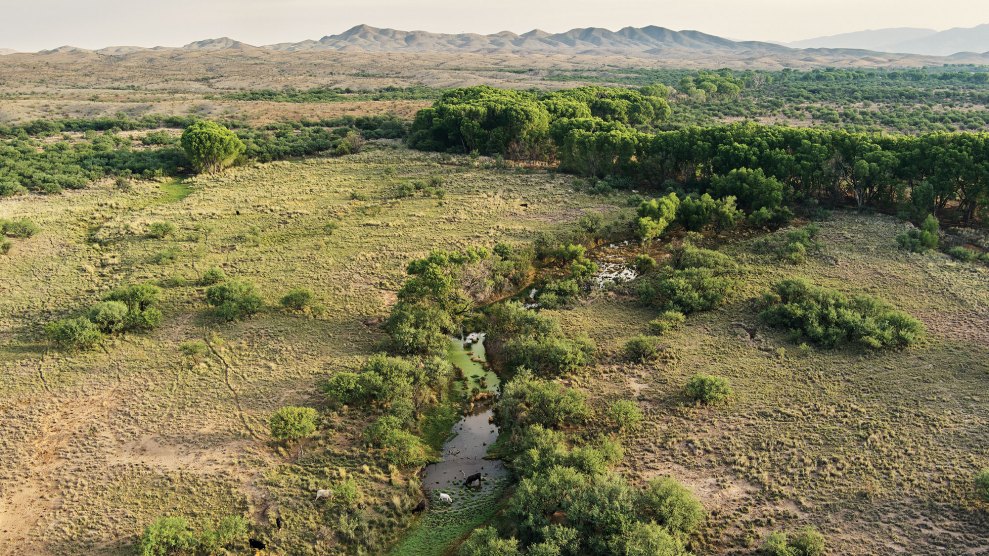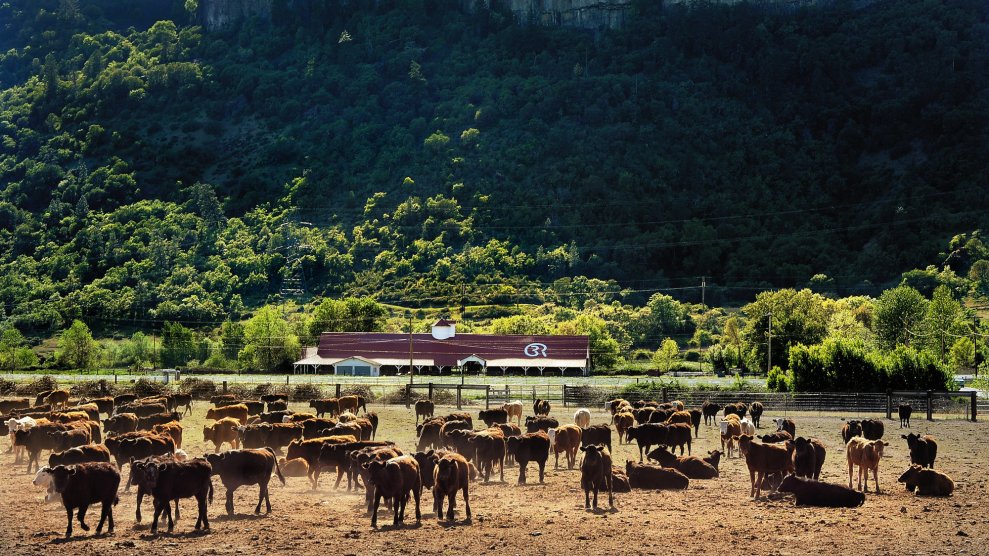
The Rosemont Copper Company operates in the Santa Rita mountains, located in southeast Arizona.Esther Frances/Inside Climate News
This story was originally published by Inside Climate News and is reproduced here as part of the Climate Desk collaboration.
After the House of Representatives passed legislation that would allow mining companies more legal rights to federal lands by a bipartisan vote of 216-195 earlier this month, a bipartisan group of Senate sponsors are moving it through their chamber.
“With the passage of the Mining Regulatory Clarity Act, we’re codifying existing precedent and unlocking our rich domestic mineral resources,” said Bruce Westerman (R-AK), the chairman of the House Natural Resources Committee, after the House passed the bill on May 8.
Nine Democrats joined with Republicans to pass the legislation, including co-sponsor Mary Peltola (D-AK).
Western legislators are leading the effort to pass the Mining Regulatory Clarity Act with the explicit goal of erasing the new legal precedent the 2022 Rosemont decision created. In that decision, the 9th US Circuit Court of Appeals sided with conservation groups, ruling that the federal government was wrong to assume the Rosemont Copper Company, mining in the Santa Rita mountains in southern Arizona, had a right to dump mining waste on federal land where the company could prove no valid mineral claim. A mining claim is valid when a company discovers a physical mineral deposit, such as lithium, lead or zinc, and the company asserts their right to mine it, according to the Bureau of Land Management.
The Rosemont decision, which the pending bill would undermine, is “a hugely important tool for citizens who are trying to stop bad mines.”
The bipartisan support for blocking the Rosemont decision follows the passage of the Inflation Reduction Act in 2022, which incentivized mining companies to take advantage of the Advanced Manufacturing Production Credit to develop mining projects for critical minerals included in the law. Many of the critical minerals designated by the Biden administration, such as zinc, manganese, and lithium, are integral to electric vehicle batteries and the transition toward a carbon-free economy.
“Everything from lithium-ion batteries to satellites relies on critical minerals, and we should be responsibly mining those right here in the US,” Sen. Catherine Cortez Masto (D-Nev.), who introduced the Senate bill with Sen. Jim Risch (R-Idaho), said in a press release. “My legislation will undo the damage of the misguided Rosemont decision and protect thousands of jobs across the West.”
There were 509 active mining plans of operation and another 806 active mining notices on federal lands in 2023, according to Steve Feldgus, deputy assistant secretary of land and minerals management at the Department of the Interior.
The Center for Biological Diversity and Save the Scenic Santa Ritas, nonprofit organizations working in Arizona, led the effort to sue the US Forest Service over its decision to allow the Rosemont Copper Company to use federal lands to dump mining waste. The Tohono O’odham Nation, Pascua Yaqui Tribe, and Hopi Tribe, among others, consider the area to be sacred, ancestral land, prompting conservation groups to file suit and prevent further development.
“What we correctly argued and the court, we think, got it right, was that if you’re going to assert rights against the United States…the agency has to check and the company has to prove that it actually has the rights under the [1872] Mining Law,” said Roger Flynn, an environmental attorney who litigated on behalf of conservation groups against the United States Forest Service in the Rosemont decision.
Flynn and other lawyers argued that the Forest Service must check the validity of mining claims before allowing a company to use federal land. The Mining Law of 1872 states that any nonmineral land next to mines used for “mining, milling, processing, beneficiation, or other operations” shall not exceed five acres, and Flynn successfully argued to the court that the Rosemont Copper Mine violated that part of the Mining Law.
Before the 2022 Rosemont decision, as a legal precedent, the Forest Service often did not require proof of valid mining claims. According to Flynn, who teaches courses on mining law at the University of Colorado, the agency has historically greenlit dozens of mining projects on federal land because of its interpretation of the 1872 Mining Law.

“I think the [1872] Mining Law automatically gives rights to these companies, the agencies do not have the discretion to say no. The Rosemont mine changed that,” Flynn said. “And that’s what has caused the industry to go to their supporters and basically take away the few guardrails that actually exist in the Mining Law.”
The Rosemont decision affirmed the previous Arizona District Court decision requiring the Forest Service to examine claim validity before allowing a mining company to put claims on federal land.
“It’s a hugely important tool for citizens who are trying to stop bad mines. Our group stresses that we’re not against mining,” said Rob Peters, executive director of Save the Scenic Santa Ritas. “But there are some places like the Santa Ritas and Patagonias that are of global biodiversity significance.”
Even with the Forest Service now preventing Rosemont from using federal lands to dump waste rock and tailings, the company is still mining the deposit.
The passage of the Mining Regulatory Clarity Act in the House and bipartisan support for it in the Senate could force the White House to intervene. The Biden administration released a statement opposing the bill in April. Senate sponsors include Kyrsten Sinema (I-Ariz.), Jacky Rosen (D-Nev.), and Lisa Murkowski (R-Alaska).
Murkowski said she co-sponsored the Mining Regulatory Clarity Act because she believes the Rosemont decision gave federal agencies too much authority to deny claims to federal lands.
“It’s just yet another example of ensuring that our agencies are held accountable to what we have crafted in the law and don’t take too much discretionary license,” Murkowski told Inside Climate News. “I think what [the Forest Service] did was a determination that was beyond the limits of their authority.”
Cortez Masto’s office told Inside Climate News in a statement that the legislation will not “fundamentally change the permitting process for mining on federal lands.”
But while Congress raced to expand the legal rights of mining companies on federal land, conservation groups raised concerns about the impacts of the bill if it becomes law.
“There cannot be a just and equitable transition to a carbon-free future, with legislation like this that sacrifices our lands.”
“If the [Rosemont] decision is overturned legislatively, like they are trying to do, I know that many of our key fights would be jeopardized, many of our key wins would be instantly overturned,” said Laiken Jordahl, the Southwest conservation advocate for the Center for Biological Diversity. “I mean, it makes no sense on its face, that a mining company can dump toxic waste on areas where they have no claims on public land.”
The Mining Regulatory Clarity Act would specifically amend the law to read “a claimant shall have the right to use and occupy to conduct operations on public land, with or without the discovery of a valuable mineral deposit” to ensure mining companies can continue staking mining claims on federal land.
In January, more than 90 environmental, climate, and Indigenous groups sent a letter to Congress opposing the law and argued that the bill would allow mining companies to permanently occupy federal public lands without valid proof of mineral deposits and would preclude other types of development on federal lands.
“There cannot be a just and equitable transition to a carbon-free future, with legislation like this that sacrifices our lands, waters, public health, sacred sites and communities,” they wrote.
Flynn noted that the precedent established in the Rosemont decision forces mining companies to prove the validity of their use of public land, in line with how other companies or groups must prove the validity of their claims.
“Mining being subject to the same laws as everybody else, that’s not going to stop mining,” Flynn said. “In some places, the worst places for the worst mines, it might, but that’s the way it should be.”
After the Mining Regulatory Clarity Act’s passage in the House, Cortez Masto and Risch urged Senate leadership to take up the Mining Regulatory Clarity Act as soon as possible. The Senate bill was referred to the Committee on Energy and Natural Resources on May 9, the day after the bill passed the House. No further action has been taken.
With increased interest in mining due to federal incentives, Flynn and other prominent conservationists urged Congress to reform the 1872 Mining Law to pass stronger regulations for how mining companies can operate on public lands. The Mining Regulatory Clarity Act would do the opposite.
“It’s just fear mongering, because [mining companies] want to go back to being the top dog on the block, and all Rosemont did was somewhat equalize the playing field and have mining treated like any other use on public lands,” Flynn said.
















